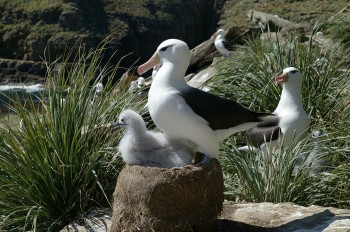Miguel Ferrer (Applied Ecology Group, Estación Biológica de Doñana, Seville, Spain) and colleagues have published in the journal Bird Study on the blood chemistry of breeding Black-browed Albatrosses Thalassarche melanophris and their chicks.
The paper’s abstract follows:
Capsule: In Black-browed Albatrosses Thalassarche melanophris nutritional condition is correlated between parents and their offspring.
Aims: To test resource allocation hypotheses analysing the relationship between parental and offspring nutritional condition.
Methods: We measured blood chemistry parameters related with nutritional condition in 24 parents and their nestlings in a colony of Black-browed Albatrosses.
Results: There were no significant differences in blood parameters between sexes or location of the nest within the colony, neither among adults nor among nestlings. We found a significant positive correlation between parents and the nutritional condition of their offspring, measured as urea, uric acid and beta-hydroxybutyrate concentrations in blood.
Discussion: These relationships demonstrate that condition of the young seems to be merely a reflection of parental condition. An interesting relationship between alkaline phosphatase concentration in adults and nutritional condition of their nestlings was found, suggesting that age of the parents would be a key factor explaining quality of the nestling.”

Black-browed Albatross stands over its chick, photograph by Ian Strange
Reference:
Miguel Ferrer, M., Morandini, V.,Perry , L.& Bechard, M. 2017. Physiological conditions of parent and offspring Black-browed Albatrosses Thalassarche melanophris. Bird Study doi.org/10.1080/00063657.2017.1314447.
John Cooper, ACAP Information Officer, 27 April 2017

 English
English  Français
Français  Español
Español